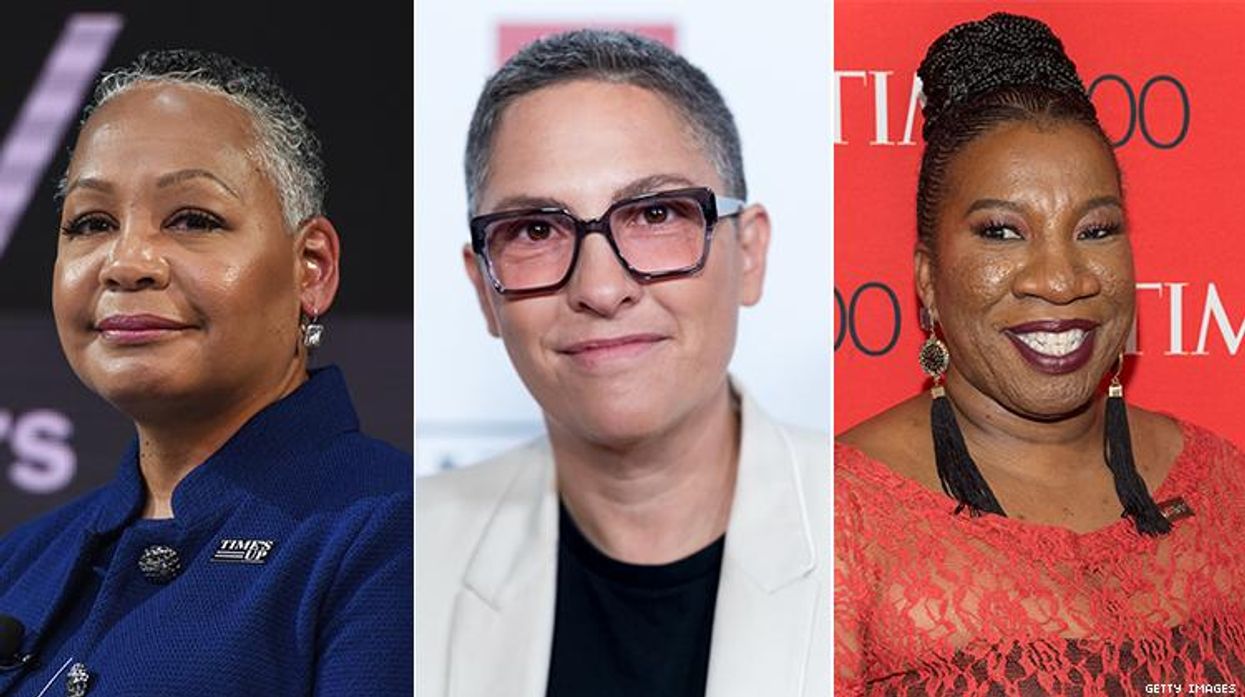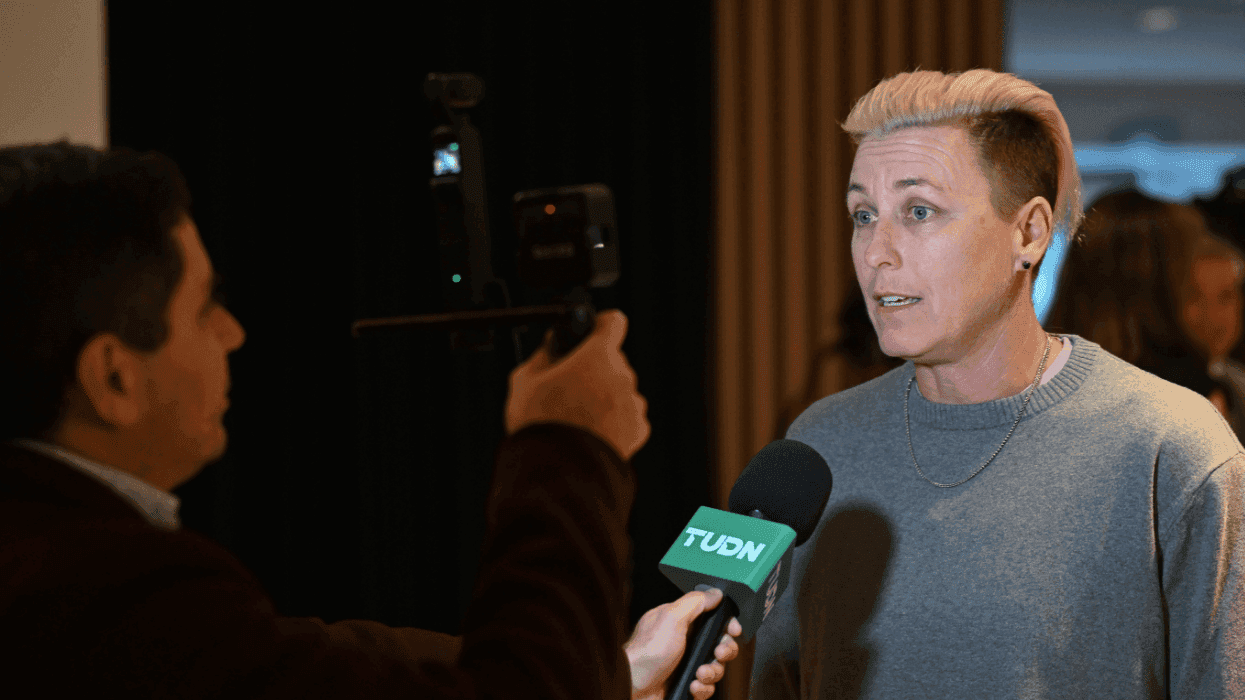One of the cases that the Time's Up Legal Defense Fund pursued this year concerns a transgender plaintiff known as "Carl." According to Time's Up Legal Defense Fund 2018 Annual Report, he worked as a cashier at a marijuana emporium in Washington, making minimum wage. The start of his employment was positive, and he was assigned extra work by his female manager. But after Carl came out to her, her behavior reportedly shifted: She allegedly became hypercritical of his work in front of customers and other employees. He says she began spying on him using the in-store video system. She also allegedly outed him to customers and colleagues, using terms like "he-she." Carl reported this abuse to more than one manager, but the behavior continued, so he quit. This is just one of many cases where Time's Up got involved.
"Clearly the issue of sexual harassment is about the power dynamic between people," says Lisa Borders, the organization's first-ever CEO and president. She consciously uses the term "people" when describing victims of sexual harassment and assault, invoking specific genders where the statistics on gender-based violence reveal them to be true: "One person has taken advantage of another person. Often that is a male taking advantage of a female, and often times the male is more financially endowed than the female is, so we want people to be able to seek remedy when they are mistreated in any way," Borders says, measuredly. "Starting a legal defense fund was clearly our answer to an acute need -- a pressing, traumatic, acute need."
It's this understanding of money as power that serves as the foundational ethos of Time's Up, which grew out of the acceleration of #MeToo, the Harvey Weinstein allegations, and the raging pervasiveness of sexual assault and harassment across all industries. Founded in early 2018 by 300 actresses, producers, writers, directors, agents, and entertainment executives, the initiative was designed to combat sexual harassment and abuse throughout the United States. In its first year, the organization has raised more than $22 million dollars for the Time's Up Legal Defense Fund, and nearly 800 attorneys are lending their expertise to about 75 active cases at time of publication. The plan going into 2019 is to challenge three prominent pillars that perpetuate abuse: culture, companies, and laws. This means, in addition to taking on individual lawsuits concerning abuse and harassment, Time's Up plans to lobby for changes within state and federal legislatures, such as abolishing statutes of a limitations for survivors of abuse.
While it was born out of outcry within the entertainment industry, Time's Up is aiming to provide resources for survivors of harassment and assault across industries -- no matter their socioeconomic status or other identities. Its existence is a salient reaction to criticism that the #MeToo movement was in danger of being co-opted as a cis, white, rich lady experience. In its first year of operation, though, 40 percent of those seeking assistance were women of color and two-thirds of those who contacted the fund identified as low-income.
But if there was an expectation for Time's Up to expand into other areas of structural oppression, or engineer a #MeToo for people who have faced racial discrimination in the same industry, Borders says they're staying focused on gender-based harassment for now. "I do believe that this is the civil rights issue of the 21st century."
Tarana Burke, activist and founder of the original Me Too movement, also has organizational plans to ensure that the activism, conversations, and resources stay intersectional, particularly now that "the excitement has died down," she says, referencing the robust social media outpouring of survivor stories and support. "I think that you'll see, in 2019, that people have a better understanding, differentiating between what we've seen in mainstream media and on social media, from actual work that has happened," Burke predicts, citing the need for more community work and "concrete impact."
Burke is hoping that her website, metoomvmt.org, will become that exact resource -- the largest aid for sexual assault and advocates available, including on-the-ground programming and more rapid response efforts. "There are a lot of resources on the internet right now," Burke observes of rape crisis centers and counseling. "[But] they're not aggregated in any one place and they tend to not be inclusive and I mean inclusive in all kinds of ways. They don't include specific resources for marginalized groups so if I'm a Black, queer, disabled woman, I may need a very specific resource that the local rape crisis center is not prepared to do, but maybe there is a community group that is just that demographic."
RELATED | The Newest Generation Of Hollywood Is More Queer Than Ever
This year, metoomvmt.org will launch an optimized search engine that will prioritize identity in creating access to support, making it possible for survivors to find counselors and healing that is specific to them, well beyond the "here's a therapist in your neighborhood," Burke explains. The resources will also include non-traditional therapy, such as reiki and body work, which is intentional. "I literally just interviewed a woman who does weight training for survivors -- never heard of it in my life, but she's certified and she's a counselor and somebody needs that," Burke adds. "Our layers of identity affect the way that we survive and sometimes people need to be a community based on that."
In 2019, Time's Up is also shifting response measures accordingly. As the organization pursues harassment and abuse claims, alleged abusers are increasingly suing workers who come forward for defamation, creating another barrier for victims, says Sharyn Tejani, the director of the Legal Defense Fund. To counter this, the Fund attorneys are focused on "complex defamation litigation." They have to consider how employers might retaliate against vulnerable employees, from threats of immigration enforcement to revoking the accuser's authorization to work.
"This is what workers fear when they come forward, and it is an effective tool to keep workers silent," says Tejani. "We've also seen cases where, as part of the retaliation, the employer informs others of an employee's gender identity without the employee's consent."
This is consistent with broader data on transgender employees: A 2018 report from the nonprofit Catalyst found that 80 percent of the trans people who were employed in 2015 endured harassment or mistreatment on the job, or made efforts to avoid it. Over a quarter said they were fired or not promoted in 2015 due to their gender identity or expression. This is symptomatic of a larger legislative omission: There is no federal law specifically protecting the rights of employees against discrimination based on gender identity or sexual orientation in the United States, and in a majority of states, workers can be fired simply for being trans. On the ground level, trans employees like Carl have little power to leverage in instances where they are being violated.
Throughout her lengthy career at the top of several private, public, and non-profit workplaces like the WNBA and Coca-Cola, Borders has observed power imbalances in many forms. But as this imbalance is being analyzed post-#MeToo, she doesn't believe that power alone should be vilified. "The imbalance is not in and of itself bad -- it's the abuse of the power that's the inherent problem," she says.
Time's Up is engineering itself to operate as the checks and balances of those powerful roles, but is constructing its organization much like a corporation -- with the CEO and president -- the most effective way to assemble against these forces? For many victims and survivors, this is the exact type of infrastructure that facilitates abuse on a systemic level.
In a draft of the Fund's annual report of 2018, actor Aziz Ansari is cited and thanked as a founding donor. Earlier that year, Babe.net published a piece, (that was contested as a sloppily reported disservice to the subject) in which a woman said Ansari sexually pressured her after a date. In a statement, Ansari acknowledged the allegations and said he thought the sex was consensual. Because Ansari's donation predated both Borders' and Tejani's employment, a Time's Up spokesperson tells Out: "In general, we are funded by individuals who are coming together to end sexual harassment and abuse. All of those who donated are listed on the GoFundMe website and we don't comment on specific individual donors." In the 2018 report Borders specifies, "We want to invite men to the table, too, even men who have transgressed against women -- we want them to learn to interact with women in a constructive way." Broadly, Borders sees distribution of power as the problem -- a deficiency she's observed throughout her professional life.
She describes discrimination, sexual harassment, and sexual assault as "symptoms" of that imbalance. "No matter where I've worked or what position I've held, there haven't been enough women in positions of power. Period. Time's Up is focused on changing the imbalance of power in leadership across society so that women of all kinds can reach their full potential."
COVER | Hari Nef and Tommy Dorfman Are Living the Rom Com of Our Dreams
But what happens once "women of all kinds" gain more power? Will "empowering" more women diminish these abuses? Jill Soloway, a founding member of Time's Up, says the organization is still evolving and learning as they go. In 2017, Jeffrey Tambor, the star of Soloway's Transparent, was accused of sexual misconduct by his former assistant, Van Barnes, and by his fellow cast member, Trace Lysette. Soloway later told Entertainment Weekly, "I don't feel responsible for Jeffrey's behavior. He's responsible for his behavior. I feel responsible for creating a workplace where people feel safe. I feel responsible in regards to helping [people] understand what threatening behavior means." (Tambor has denied these allegations.)
"We're not perfect, but I do think things are moving in the right direction," Soloway says. Does that right direction include any initiatives to expand the rhetoric of "women" and "sisters" to include nonbinary survivors who do not identify as women? ("Time's Up's Letter of Solidarity," in January 2018, began with "Dear Sisters.") "Absolutely. This is something I've spoken personally about within [the organization]. As a nonbinary person, being called a 'sister' doesn't allow me to feel seen by the movement -- and that's a problem. The good news is, once I shared this with my Time's Up siblings, the response was overwhelmingly positive and the word 'sibling' started to be used here and there. I wouldn't say we have a special initiative around this, but I do think as an organization we are aware of how important language is, and my trans and nonbinary siblings within the movement feel comfortable kindly reminding everyone of the most inclusive kind of language."
The most dominant #MeToo narratives have focused on a heterosexual dynamic: a cis male predator and cis female victim. But limited studies reveal that sexual abuse is quite common within same-sex dynamics, which go more underreported than heterosexual abuses. Does Time's Up plan to complicate this cultural narrative and include more survivors who aren't being abused by straight men?
"I don't think it's that simple, that all feminist movements must be equally invested in harassment between queer folks or let's say, female-on-male harassment," says Soloway, who recounts early Time's Up meetings in their memoir, She Wants It: Desire, Power, and Toppling the Patriarchy. "For Time's Up to purposely 'complicate the narrative' this soon in this revolution wouldn't allow the reveal of how systemic biases caused by patriarchal privilege are at play in so many interactions. People ask me all the time if women can abuse people, or they point out male survivors. Of course these instances are true, but the takeaways at this moment in time have to be around this reckoning [with] gender privilege, and particularly around the moral-cultural shift in what is and isn't acceptable at a workplace environment, where, for the most part, cis men have been in power and continue to be in power and thus in control of women/queer people/trans people's destinies in ways that they must take into account."
How Time's Up navigates this stands to break with some tenets of traditional feminist organizing, which have historically forgotten, relegated, or directly excluded trans women, despite them experiencing some of the highest levels of gender-based violence. For their part, Soloway has co-founded a strategic initiative within Time's Up Entertainment called 50/50 by 2020, designed to get more of an intersectional lens within the arts. In partnership with GLAAD, they published the TransForm Hollywood open letter and guide last year, in which "Hollywood's major players," as Soloway says, committed to casting trans actors for trans roles. This is tactical.
"Of course, this is only one small part of the issues trans people face," Soloway says, "but part of why trans folks have been so upset by cis actors playing trans roles is because it contributes to this false narrative that trans women are 'really just men in dresses.' That myth is at the source of an enormous amount of hatred and violence toward trans women. By trying to influence the culture (a space where we have a lot of impact and sway), hopefully we can help address the root of some of these injustices."
Borders is also confident that Time's Up will continue to operate from a lens of deep intersectionality. "We will treat our trans sisters and the LGBT community as our community -- the community of the human race that needs to be supported and needs to be protected."
To read more, grab your own copy of Out's February issue featuring Hari Nef and and Tommy Dorfman as the cover on Kindle, Nook and Zinio today, and on newsstands January 22. Preview more of the issue here. Get a year's subscription for $19.95.






























